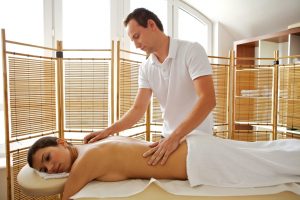Updated May 6, 2020
The American College of Physicians (ACP) has issued new guidelines for treating low back pain that recommend massage and acupuncture over drugs. Low back pain is the 5th most common reason for doctor visits by Americans, with about a quarter of all US adults reporting low back pain in the past 3 months alone.
The evidence-based clinical practice guideline, published on February 14, 2017 recommends massage, acupuncture, taiji, yoga, and other non-pharmacologic treatments as the first treatments of choice for low back pain, suggesting drugs such as aspirin or ibuprofen only if initial non-drug treatments don’t work. The prescription of stronger drugs is discouraged unless all other options have failed.
“Physicians should reassure their patients that acute and subacute low back pain usually improves over time regardless of treatment,” said Nitin S. Damle, MD, MS, MACP, president of the ACP. “Physicians should avoid prescribing unnecessary tests and costly and potentially harmful drugs, especially narcotics, for these patients.”
Are you interested in becoming a certified massage therapist?
Visit the links below to explore our massage therapy programs at a campus near you:
Reassessment of Medication Efficacy and Alternative Approaches
Acetaminophen was strongly recommended as a first-line medication in ACP’s 2007 guidelines, but evidence collected over the past decade reverses that recommendation. No difference was found between acetaminophen and placebo for either reduction of pain or improvement of function over the course of a month. This reflects recent findings from double-blind controlled trials such as an Australian study conducted over 4 years by Williams, Maher, Latimer, et al. Aspirin and other NSAIDs resulted in only a small improvement. In general, in this new study, Western medical tests and treatments for low back pain were found to be highly variable, inexplicable, and sometimes expensive, but most resulted in similar outcomes. The 2007 guideline did not even assess some non-pharmacologic options such as mindfulness-based stress reduction and taiji.
Featured Posts:

